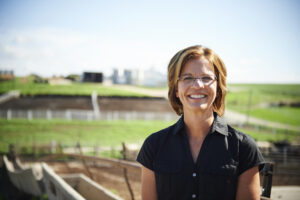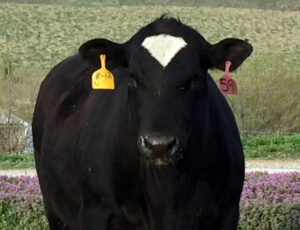If your family is anything like mine, you’ve likely heard of the infamous “five-second rule.” With this rule, if food is ever dropped, there exists roughly five seconds before it can be picked up and consumed or else the food becomes “dirty” and should be discarded. This was a rule my family and I lived by growing up. Obviously, this rule doesn’t hold up and has no scientific backing, but sometimes we still shout out “five-second rule!” when we see food fall to the ground. Perhaps the rule started as a way to reduce food waste from a generation who went through the Great Depression. I would agree reducing food waste is important, but as a mom and grandma I value food safety much more.

Food safety is also very important to me in my full-time role as a farmer. My husband and I farm northwest of Omaha. We care for cattle in the finishing phase right before they become beef on your plate. Farmers and ranchers, like us, take very seriously the safety of our food supply in relation to how we care for our animals, land and water. We also constantly strive to provide high-quality and safe foods for our families and for yours.
Two of the most common consumer concerns about food safety from the beef perspective come from the use of antibiotics and added hormones. As someone who takes tremendous care and pride in raising healthy livestock, I can tell you there are three important safety questions guiding our use of any product. Is it safe for the animal? Safe for the environment? And safe for people?
Antibiotics are an important tool to help us care for animals when they get sick. Veterinary oversight and direction are key to helping farms like ours make sure the right antibiotic treats the right ailment and is administered in the right manner. Through intensive research, our veterinarians and pharmaceutical companies provide us with the direction needed to make sure an antibiotic is cleared from the body before entering the food supply.
Added hormones are safely used in cattle to efficiently help them turn the feed they eat into lean muscle using fewer resources. The added hormones are tiny pellets placed under the skin of the ear. Over the course of several months the hormones in the pellets work with the body to promote the development of more lean muscle. This increased efficiency of raising beef has allowed cattle producers, like myself, to produce more food for a growing population, while reducing our environmental impact, which helps the planet.

My family, and farm families like ours, take great pride in producing quality foods using the safest methods. While we make sure our animals receive the best care possible, we are always aware of the beef they will become. While I cannot be there to make sure your little ones ignore the five-second rule about food on the ground, I can reassure you that farmers like us have invested our own dollars for research and protocols to help us make sure the beef you enjoy is safe.
If you have any questions regarding food and the safety of our food production system, visit CommonGroundNebraska.com and follow us on social media.
